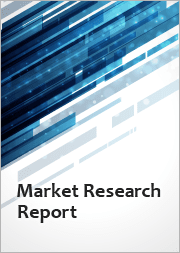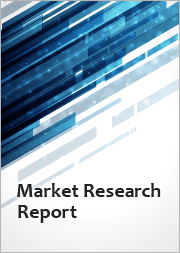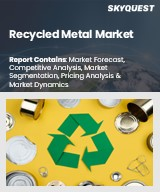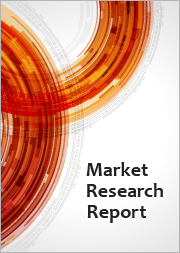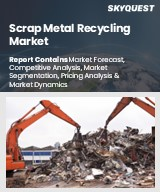
|
시장보고서
상품코드
1744602
비철금속 재활용 시장 : 금속유형별, 스크랩유형별, 스크랩공급원별, 리사이클 방법별, 예측(-2032년)Nonferrous Metal Recycling Market Forecasts to 2032 - Global Analysis By Metal Type, Scrap Type (New Scrap, and Old Scrap ), Source of Scrap, Recycling Method, End User, and By Geography |
||||||
Stratistics MRC에 따르면 세계의 비철금속 재활용 시장은 예측 기간 동안 CAGR 5.3%로 성장할 것으로 예측됩니다.
비철금속 재활용은 다량의 철을 함유하지 않는 금속의 회수, 가공 및 재사용을 포함합니다. 알루미늄, 구리, 납, 아연 및 니켈을 포함한 이러한 금속은 재활용을 반복하여 화학적 특성을 유지합니다. 이 프로세스는 환경에 미치는 영향을 줄이고 천연 자원을 보호하며 에너지 효율을 지원합니다. 비철금속은 건설, 자동차, 전자기기, 항공우주산업에서 널리 사용되고 있으며, 재활용은 지속가능한 산업개발과 순환형 경제 실천에 필수적입니다.
미국 환경보호청(EPA)에 따르면 알루미늄, 구리, 황동과 같은 비철금속 재활용은 에너지 소비를 크게 줄여 원료 광석에서 금속을 생산하는 데 필요한 에너지의 최대 95%를 절약합니다.
비철금속 수요 증가
알루미늄, 구리, 아연과 같은 비철금속에 대한 수요 증가는 비철금속 재활용 시장의 주요 촉진요인입니다. 이러한 급증은 건설, 자동차, 가전, 신재생에너지와 같은 급증하는 분야에서 광범위한 사용으로 추진되고 있습니다. 게다가 비철금속은 그 특성을 잃지 않고 반복적으로 재활용할 수 있어 지속가능한 공급을 보장하고, 1차 채굴에 대한 의존도를 줄이고, 순환형 경제 이니셔티브를 지원합니다. 게다가 환경규제와 사회의식 증가가 재활용 비철금속 수요를 더욱 자극하고 시장성장을 뒷받침하고 있습니다.
부적절한 재활용 인프라
많은 지역, 특히 신흥 경제 국가들은 불충분 한 회수 시스템, 오래된 처리 기술, 표준화 된 관행의 부족과 같은 문제에 직면 해 있습니다. 주기율 저하를 초래합니다. 또한 일관성 없는 공급망과 현대적인 설비에 대한 제한된 투자는 문제를 더욱 악화시키고, 증가하는 수요에 대응하고, 점점 더 엄격한 환경 규제를 준수하는 시장의 능력을 제한하고 있습니다.
전자폐기물 및 자동차 재활용 성장
전자기기와 전기자동차의 보급은 구리, 알루미늄, 희토류 원소 등 귀중한 비철금속을 풍부하게 포함한 대량의 완제품을 만들어 내고 있습니다. 첨단 재활용 기술에 대한 투자를 촉구하고 있으며, 도시 광산과 폐쇄 루프 재활용 시스템이 출현하고 있으며 복잡한 폐기물 흐름으로부터 비철금속의 회수를 더욱 강화하고 시장 성장을 가속하고 있습니다.
버진 금속 생산과의 경쟁
세계의 상품 가격의 변동은 1차 금속 생산을 보다 경제적으로 매력적인 것으로 하고, 리사이클 재료의 경쟁력을 저하시킬 가능성이 있습니다. 특히 천연 자원이 풍부한 지역에서는 보다 저렴한 버진 금속이 입수 가능하게 되어, 리사이클의 대처가 약체화할 가능성이 있습니다. 또한, 1차 금속의 추출과 가공에 있어서의 기술의 발전은 재활용 분야에 더욱 도전이 될 수 있습니다.
COVID-19의 영향 :
COVID-19의 대유행은 비철금속 재활용 시장에 현저한 악영향을 미쳤습니다. 그 결과, 재생 비철금속의 이용가능성과 수요가 줄어들었습니다.
예측 기간 동안 알루미늄 부문이 최대가 될 것으로 예측됩니다.
예측 기간 동안 가장 큰 시장 점유율을 차지할 것으로 예상되는 것은 알루미늄 부문입니다. 손실 없이 무기한으로 재활용할 수 있기 때문에 비용 효율적이고 환경 친화적인 솔루션을 요구하는 제조업체에게 선호되는 재료가 되고 있습니다.
예측기간 동안 화학재활용 분야의 CAGR이 가장 높아질 전망
예측 기간 동안 화학 재활용 분야가 가장 높은 성장률을 보일 것으로 예측됩니다. 순도와 수율을 높여 이전에는 어려웠던 폐기물 흐름의 재활용을 지원합니다.
최대 점유율을 차지하는 지역
예측 기간 동안 아시아태평양이 가장 큰 시장 점유율을 차지할 것으로 예측됩니다. 순환 경제 실천을 촉진하는 정부 정책은 재활용 활동을 강화합니다. 또한, 대규모의 리사이클 사업이 존재해, 건설, 자동차, 일렉트로닉스 부문에서의 수요가 늘고 있는 것도, 아시아태평양 세계 시장에 있어서의 주도적 지위를 한층 더 견고한 것으로 하고 있습니다.
CAGR이 가장 높은 지역 :
예측 기간 동안 아시아태평양이 가장 높은 CAGR을 나타낼 것으로 예측됩니다. 재활용 기술에 대한 투자 증가는 시장 확대를 가속화하고 있으며, 폐기물 관리 시스템을 개선하고 혁신적인 재활용 프로세스를 통합하기 위한 노력으로 아시아태평양은 가장 빠르게 성장하고 있습니다.
무료 맞춤형 서비스
이 보고서를 구독하는 고객은 다음 무료 맞춤설정 옵션 중 하나를 사용할 수 있습니다.
- 기업 프로파일
- 추가 시장 기업의 종합적 프로파일링(3개사까지)
- 주요 기업의 SWOT 분석(3개사까지)
- 지역 세분화
- 고객의 관심에 응한 주요국 시장 추정, 예측 및 CAGR(주 : 타당성 확인에 따름)
- 경쟁 벤치마킹
- 제품 포트폴리오, 지리적 존재, 전략적 제휴에 기반한 주요 기업 벤치마킹
목차
제1장 주요 요약
제2장 서문
- 개요
- 이해관계자
- 조사 범위
- 조사 방법
- 데이터 마이닝
- 데이터 분석
- 데이터 검증
- 조사 접근
- 조사 자료
- 1차 조사 자료
- 2차 조사 정보원
- 전제조건
제3장 시장 동향 분석
- 성장 촉진요인
- 억제요인
- 기회
- 위협
- 최종 사용자 분석
- 신흥 시장
- COVID-19의 영향
제4장 Porter's Five Forces 분석
- 공급기업의 협상력
- 구매자의 협상력
- 대체품의 위협
- 신규 참가업체의 위협
- 경쟁 기업간 경쟁 관계
제5장 세계의 비철금속 재활용 시장 : 금속유형별
- 알루미늄
- 구리
- 납
- 아연
- 니켈
- 기타 금속의 유형
제6장 세계의 비철금속 재활용 시장 : 스크랩유형별
- 신규 스크랩(제조 폐기물)
- 낡은 스크랩(사용한 폐기물)
제7장 세계의 비철금속 재활용 시장 : 스크랩공급원별
- 제조업
- 건설폐기물
- 사용한 자동차(ELV)/자동차 스크랩
- 폐전기전자기기(WEEE)/전자폐기물
- 기타 사용후 제품
제8장 세계의 비철금속 재활용 시장 : 리사이클 방법별
- 물리적 재활용
- 열 재활용
- 케미컬 리사이클
- 전기화학적 재활용
제9장 세계의 비철금속 재활용 시장 : 최종 사용자별
- 자동차 및 운송
- 건축 및 건설
- 전기 및 전자
- 산업기계
- 가전제품?잡화
- 패키지
- 에너지 및 전력
- 항공우주 및 방어
- 기타 최종 사용자
제10장 세계의 비철금속 재활용 시장 : 지역별
- 북미
- 미국
- 캐나다
- 멕시코
- 유럽
- 독일
- 영국
- 이탈리아
- 프랑스
- 스페인
- 기타 유럽
- 아시아태평양
- 일본
- 중국
- 인도
- 호주
- 뉴질랜드
- 한국
- 기타 아시아태평양
- 남미
- 아르헨티나
- 브라질
- 칠레
- 기타 남미
- 중동 및 아프리카
- 사우디아라비아
- 아랍에미리트(UAE)
- 카타르
- 남아프리카
- 기타 중동 및 아프리카
제11장 주요 발전
- 계약, 파트너십, 협업, 합작투자
- 인수와 합병
- 신제품 발매
- 사업 확대
- 기타 주요 전략
제12장 기업 프로파일링
- Sims Limited
- Aurubis AG
- Umicore NV
- Novelis Inc.
- Glencore plc
- European Metal Recycling(EMR)
- Dowa Holdings Co., Ltd.
- OmniSource Corporation
- SA Recycling LLC
- Commercial Metals Company(CMC)
- Nucor Corporation
- Metallo-Chimique
- Jintian Copper(Ningbo Jintian Copper Group Co., Ltd.)
- Sungho Group
- Toho Zinc Co., Ltd.
- Scholz Recycling GmbH
- Radius Recycling
- Gravita India Ltd.
According to Stratistics MRC, the Global Nonferrous Metal Recycling Market is growing at a CAGR of 5.3% during the forecast period. Nonferrous metal recycling involves the collection, processing, and reuse of metals that do not contain significant amounts of iron. These metals, including aluminum, copper, lead, zinc, and nickel, retain their chemical properties through repeated recycling. The process reduces environmental impact, conserves natural resources, and supports energy efficiency. Nonferrous metals are widely used in construction, automotive, electronics, and aerospace industries, making their recycling vital for sustainable industrial development and circular economy practices.
According to the United States Environmental Protection Agency (EPA), recycling of nonferrous metals like aluminum, copper, and brass significantly reduces energy consumption, saving up to 95% of the energy required to produce metals from raw ore.
Market Dynamics:
Driver:
Growing demand for nonferrous metals
The rising demand for nonferrous metals such as aluminum, copper, and zinc is a key driver for the nonferrous metal recycling market. This surge is propelled by their extensive use in rapidly expanding sectors like construction, automotive, consumer electronics, and renewable energy. Furthermore, the ability of nonferrous metals to be recycled repeatedly without losing their properties ensures a sustainable supply, reducing reliance on primary mining and supporting circular economy initiatives. Additionally, environmental regulations and increased societal awareness further stimulate demand for recycled nonferrous metals, bolstering market growth.
Restraint:
Inadequate recycling infrastructure
Many regions, particularly in developing economies, face challenges such as insufficient collection systems, outdated processing technologies, and a lack of standardized practices. These limitations hinder efficient recovery and processing of nonferrous metals, leading to higher operational costs and reduced recycling rates. Moreover, inconsistent supply chains and limited investment in modern facilities further exacerbate the issue, restricting the market's ability to meet growing demand and comply with increasingly stringent environmental regulations.
Opportunity:
Growth of e-waste and automotive recycling
The proliferation of electronic devices and electric vehicles is generating significant volumes of end-of-life products rich in valuable nonferrous metals like copper, aluminum, and rare earth elements. Moreover, regulatory mandates for proper e-waste disposal and the push for sustainable automotive manufacturing are encouraging investment in advanced recycling technologies. Additionally, urban mining and closed-loop recycling systems are emerging, further enhancing the recovery of nonferrous metals from complex waste streams and driving market growth.
Threat:
Competition from virgin metal production
Fluctuations in global commodity prices can make primary metal production more economically attractive, reducing the competitiveness of recycled materials. The availability of cheaper virgin metals, particularly in regions with abundant natural resources, can undermine recycling initiatives. Additionally, technological advancements in primary metal extraction and processing may further challenge the recycling sector.
Covid-19 Impact:
The Covid-19 pandemic had a pronounced negative impact on the nonferrous metal recycling market. Lockdowns and restrictions led to the temporary closure of recycling facilities, disrupted supply chains, and caused a sharp decline in industrial activity across sectors such as construction, automotive, and manufacturing. This resulted in reduced availability and demand for recycled nonferrous metals. Additionally, price volatility and logistical challenges further strained the market. However, as economies gradually reopened, recovery began, supported by renewed demand and the adoption of improved waste management practices.
The aluminum segment is expected to be the largest during the forecast period
The aluminum segment is expected to account for the largest market share during the forecast period. Aluminum's dominance stems from its widespread application in industries such as construction, automotive, and packaging, where its lightweight, corrosion resistance, and high recyclability are highly valued. The ability to recycle aluminum indefinitely without loss of quality makes it a preferred material for manufacturers seeking cost-effective and environmentally responsible solutions. Additionally, the energy savings achieved through recycling aluminum, compared to primary production, further amplify its market share.
The chemical recycling segment is expected to have the highest CAGR during the forecast period
Over the forecast period, the chemical recycling segment is predicted to witness the highest growth rate. Chemical recycling technologies enable the breakdown of complex nonferrous metal-containing products, such as e-waste and multi-material composites, into their base elements for efficient recovery. Advancements in chemical processes enhance metal purity and yield, supporting the recycling of previously challenging waste streams. Additionally, the rising emphasis on sustainability and resource efficiency is driving investment in innovative chemical recycling solutions, positioning this segment for accelerated expansion.
Region with largest share:
During the forecast period, the Asia Pacific region is expected to hold the largest market share. This dominance is attributed to rapid industrialization, urbanization, and substantial investments in infrastructure across countries like China and India. The region's strong manufacturing base, increasing environmental awareness, and government policies promoting circular economy practices bolster recycling activities. Additionally, the presence of large-scale recycling operations and growing demand from the construction, automotive, and electronics sectors further reinforce Asia Pacific's leading position in the global market.
Region with highest CAGR:
Over the forecast period, the Asia Pacific region is anticipated to exhibit the highest CAGR. The region's robust economic growth, expanding urban populations, and rising consumer demand for durable goods drive the need for sustainable raw materials. Stringent environmental regulations and increasing investments in advanced recycling technologies are accelerating market expansion. Additionally, initiatives to improve waste management systems and the integration of innovative recycling processes position Asia Pacific as the fastest growing region.
Key players in the market
Some of the key players in Nonferrous Metal Recycling Market include Sims Limited, Aurubis AG, Umicore NV, Novelis Inc., Glencore plc, European Metal Recycling (EMR), Dowa Holdings Co., Ltd., OmniSource Corporation, SA Recycling LLC, Commercial Metals Company (CMC), Nucor Corporation, Metallo-Chimique, Jintian Copper (Ningbo Jintian Copper Group Co., Ltd.), Sungho Group, Toho Zinc Co., Ltd., Scholz Recycling GmbH, Radius Recycling and Gravita India Ltd.
Key Developments:
In April 2025, DOWA ECO-SYSTEM CO., LTD. a subsidiary of DOWA HOLDINGS CO., LTD. plans to construct a base facility for its environmental management and recycling business in Kumamoto in 2025. This initiative is in response to Japan's increasing demand for products and services contributing to resource recycling and decarbonization in Japan. To further expand its business, the company has decided to establish a complex base facility for its environmental management and recycling business (hereinafter the "New Base") in the North Kanto area, following the one in Kyushu. For this purpose, the company has acquired an industrial site in Section 2 of Oyama No.4 Industrial Park, which will be newly established in Oyama City, Tochigi.
In October 2024, Novelis, the world's largest recycler of aluminum and leading supplier of flat-rolled, low-carbon aluminum products, has entered into a strategic 3-year agreement with TSR Recycling GmbH & Co. KG. The contract strengthens the long-standing partnership between Novelis and TSR, ensuring a reliable supply of raw materials made from presorted and processed end-of-life aluminum products of approximately 75,000 tonnes to be fed into Novelis' production of low-carbon aluminum sheet for the automotive sector.
Metal Types Covered:
- Aluminum
- Copper
- Lead
- Zinc
- Nickel
- Other Metal Types
Scrap Types Covered:
- New Scrap (Manufacturing Waste)
- Old Scrap (Post-Consumer Waste)
Source of Scraps Covered:
- Manufacturing & Fabrication Industries
- Construction & Demolition (C&D) Waste
- End-of-Life Vehicles (ELV) / Automotive Scrap
- Waste Electrical and Electronic Equipment (WEEE) / E-waste
- Other Post-Consumer Products
Recycling Methods Covered:
- Physical Recycling
- Thermal Recycling
- Chemical Recycling
- Electrochemical Recycling
End Users Covered:
- Automotive & Transportation
- Building & Construction
- Electrical & Electronics
- Industrial Machinery
- Consumer Appliances & Goods
- Packaging
- Energy & Power
- Aerospace & Defense
- Other End Users
Regions Covered:
- North America
- US
- Canada
- Mexico
- Europe
- Germany
- UK
- Italy
- France
- Spain
- Rest of Europe
- Asia Pacific
- Japan
- China
- India
- Australia
- New Zealand
- South Korea
- Rest of Asia Pacific
- South America
- Argentina
- Brazil
- Chile
- Rest of South America
- Middle East & Africa
- Saudi Arabia
- UAE
- Qatar
- South Africa
- Rest of Middle East & Africa
What our report offers:
- Market share assessments for the regional and country-level segments
- Strategic recommendations for the new entrants
- Covers Market data for the years 2024, 2025, 2026, 2028, and 2032
- Market Trends (Drivers, Constraints, Opportunities, Threats, Challenges, Investment Opportunities, and recommendations)
- Strategic recommendations in key business segments based on the market estimations
- Competitive landscaping mapping the key common trends
- Company profiling with detailed strategies, financials, and recent developments
- Supply chain trends mapping the latest technological advancements
Free Customization Offerings:
All the customers of this report will be entitled to receive one of the following free customization options:
- Company Profiling
- Comprehensive profiling of additional market players (up to 3)
- SWOT Analysis of key players (up to 3)
- Regional Segmentation
- Market estimations, Forecasts and CAGR of any prominent country as per the client's interest (Note: Depends on feasibility check)
- Competitive Benchmarking
- Benchmarking of key players based on product portfolio, geographical presence, and strategic alliances
Table of Contents
1 Executive Summary
2 Preface
- 2.1 Abstract
- 2.2 Stake Holders
- 2.3 Research Scope
- 2.4 Research Methodology
- 2.4.1 Data Mining
- 2.4.2 Data Analysis
- 2.4.3 Data Validation
- 2.4.4 Research Approach
- 2.5 Research Sources
- 2.5.1 Primary Research Sources
- 2.5.2 Secondary Research Sources
- 2.5.3 Assumptions
3 Market Trend Analysis
- 3.1 Introduction
- 3.2 Drivers
- 3.3 Restraints
- 3.4 Opportunities
- 3.5 Threats
- 3.6 End User Analysis
- 3.7 Emerging Markets
- 3.8 Impact of Covid-19
4 Porters Five Force Analysis
- 4.1 Bargaining power of suppliers
- 4.2 Bargaining power of buyers
- 4.3 Threat of substitutes
- 4.4 Threat of new entrants
- 4.5 Competitive rivalry
5 Global Nonferrous Metal Recycling Market, By Metal Type
- 5.1 Introduction
- 5.2 Aluminum
- 5.3 Copper
- 5.4 Lead
- 5.5 Zinc
- 5.6 Nickel
- 5.7 Other Metal Types
6 Global Nonferrous Metal Recycling Market, By Scrap Type
- 6.1 Introduction
- 6.2 New Scrap (Manufacturing Waste)
- 6.3 Old Scrap (Post-Consumer Waste)
7 Global Nonferrous Metal Recycling Market, By Source of Scrap
- 7.1 Introduction
- 7.2 Manufacturing & Fabrication Industries
- 7.3 Construction & Demolition (C&D) Waste
- 7.4 End-of-Life Vehicles (ELV) / Automotive Scrap
- 7.5 Waste Electrical and Electronic Equipment (WEEE) / E-waste
- 7.6 Other Post-Consumer Products
8 Global Nonferrous Metal Recycling Market, By Recycling Method
- 8.1 Introduction
- 8.2 Physical Recycling
- 8.3 Thermal Recycling
- 8.4 Chemical Recycling
- 8.5 Electrochemical Recycling
9 Global Nonferrous Metal Recycling Market, By End User
- 9.1 Introduction
- 9.2 Automotive & Transportation
- 9.3 Building & Construction
- 9.4 Electrical & Electronics
- 9.5 Industrial Machinery
- 9.6 Consumer Appliances & Goods
- 9.7 Packaging
- 9.8 Energy & Power
- 9.9 Aerospace & Defense
- 9.10 Other End Users
10 Global Nonferrous Metal Recycling Market, By Geography
- 10.1 Introduction
- 10.2 North America
- 10.2.1 US
- 10.2.2 Canada
- 10.2.3 Mexico
- 10.3 Europe
- 10.3.1 Germany
- 10.3.2 UK
- 10.3.3 Italy
- 10.3.4 France
- 10.3.5 Spain
- 10.3.6 Rest of Europe
- 10.4 Asia Pacific
- 10.4.1 Japan
- 10.4.2 China
- 10.4.3 India
- 10.4.4 Australia
- 10.4.5 New Zealand
- 10.4.6 South Korea
- 10.4.7 Rest of Asia Pacific
- 10.5 South America
- 10.5.1 Argentina
- 10.5.2 Brazil
- 10.5.3 Chile
- 10.5.4 Rest of South America
- 10.6 Middle East & Africa
- 10.6.1 Saudi Arabia
- 10.6.2 UAE
- 10.6.3 Qatar
- 10.6.4 South Africa
- 10.6.5 Rest of Middle East & Africa
11 Key Developments
- 11.1 Agreements, Partnerships, Collaborations and Joint Ventures
- 11.2 Acquisitions & Mergers
- 11.3 New Product Launch
- 11.4 Expansions
- 11.5 Other Key Strategies
12 Company Profiling
- 12.1 Sims Limited
- 12.2 Aurubis AG
- 12.3 Umicore NV
- 12.4 Novelis Inc.
- 12.5 Glencore plc
- 12.6 European Metal Recycling (EMR)
- 12.7 Dowa Holdings Co., Ltd.
- 12.8 OmniSource Corporation
- 12.9 SA Recycling LLC
- 12.10 Commercial Metals Company (CMC)
- 12.11 Nucor Corporation
- 12.12 Metallo-Chimique
- 12.13 Jintian Copper (Ningbo Jintian Copper Group Co., Ltd.)
- 12.14 Sungho Group
- 12.15 Toho Zinc Co., Ltd.
- 12.16 Scholz Recycling GmbH
- 12.17 Radius Recycling
- 12.18 Gravita India Ltd.






